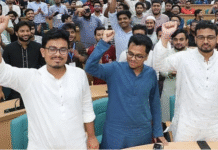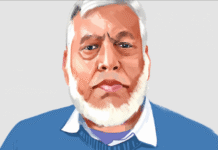
Last update on: Sat Jul 26, 2025 08:00 PM

We are deeply concerned by the findings of Ain o Salish Kendra (ASK), which indicate that grave human rights violations took place on July 16 in Gopalganj during the political rally of the National Citizen Party (NCP). In its report, ASK stated that excessive force was used, innocent civilians were harassed, mass arrests were carried out, and alleged unlawful killings took place on that day. However, the district’s superintendent of police claimed that security forces exercised “maximum restraint” and did not use lethal weapons, contradicting ASK’s findings. The report highlighted the involvement of multiple law enforcement agencies in the clashes, which led to the deaths of five civilians and injuries to dozens. Reportedly, hundreds of people were arrested later, and thousands were accused in cases filed in connection with the deadly violence. Among those detained were individuals and minors who reportedly had no link to the events. This type of behaviour by law enforcement makes us wonder whether anything has changed since the July uprising last year.
Eyewitnesses told ASK that while attackers used stones and crude weapons, no firearms were visible, yet law enforcers fired live bullets indiscriminately. Families of the deceased alleged that hospital authorities rushed the handover of bodies, pressuring them to proceed with burial or cremation without post-mortem examinations. Except for Ramzan Munshi, none of the victims initially underwent autopsy. One victim, Imon—a crockery shop worker with no political ties—was reportedly beaten severely, including being stomped on the face by security forces. Following much public outcry, the bodies of three individuals were exhumed five days after burial for post-mortem exams upon a court order, causing further distress to their families. The wholesale filing of cases—including three under the Anti-Terrorism Act, one under the Special Powers Act of 1974, and the rest under various sections of the penal code—has also spread fear among local residents.
Eyewitness accounts present a troubling picture of law enforcement’s handling of the Gopalganj incident, which is strikingly reminiscent of the tactics used under the autocratic regime of Sheikh Hasina. Their response appears to follow a familiar formula seen during the Awami League’s tenure: use of excessive force, mass arrests, indiscriminate case filings, among others. Alarmingly, even children have reportedly been charged under the Anti-Terrorism Act of 2009, raising serious human rights concerns.
We urge the government to hold an independent investigation into the Gopalganj violence and ensure justice for the victims. While those responsible for the attacks on the NCP must be brought to justice, those accountable for the loss of lives must also face consequences. Last but not least, the system that continues to permit law enforcers and security forces to use excessive force and lethal weapons, and act with such brutality, must be urgently reformed.









